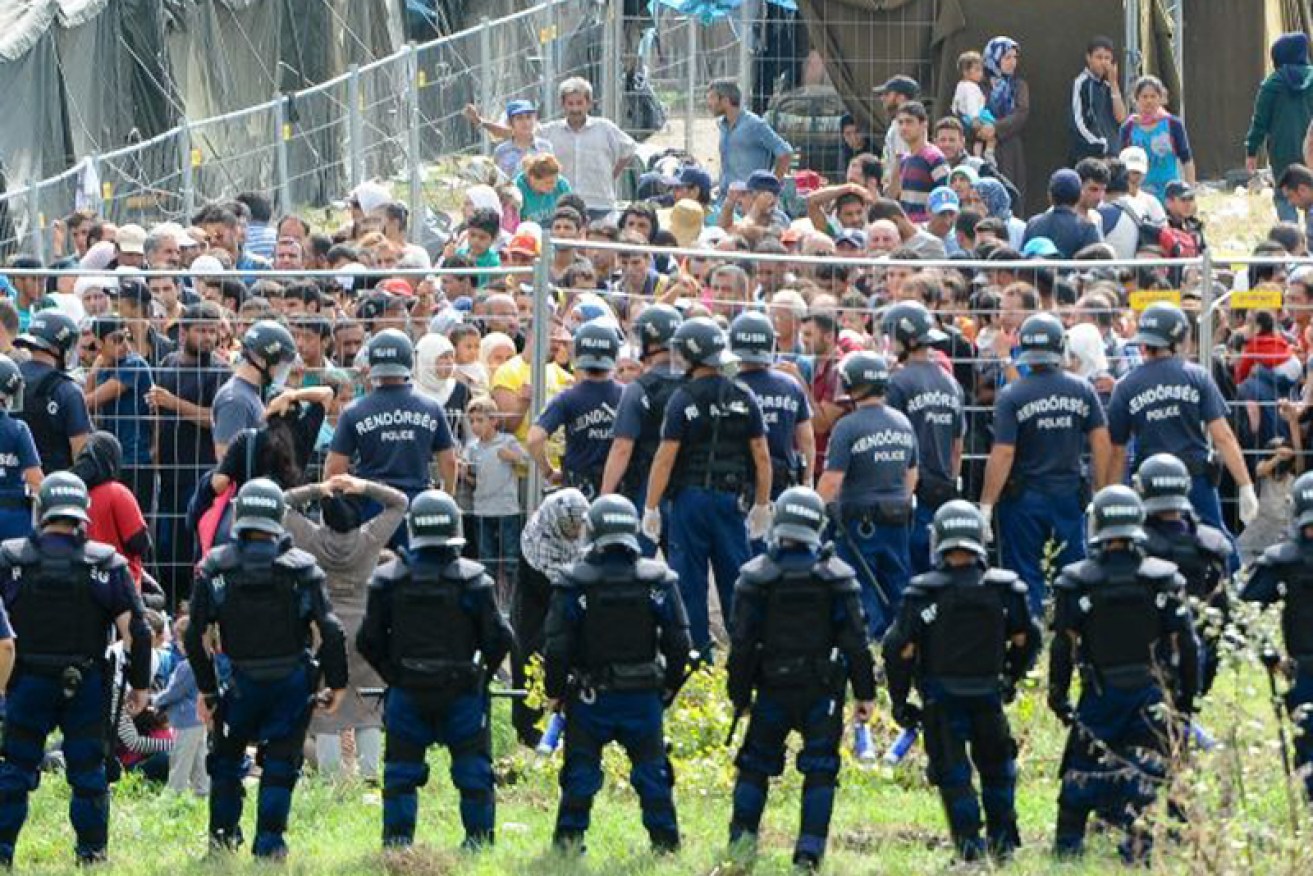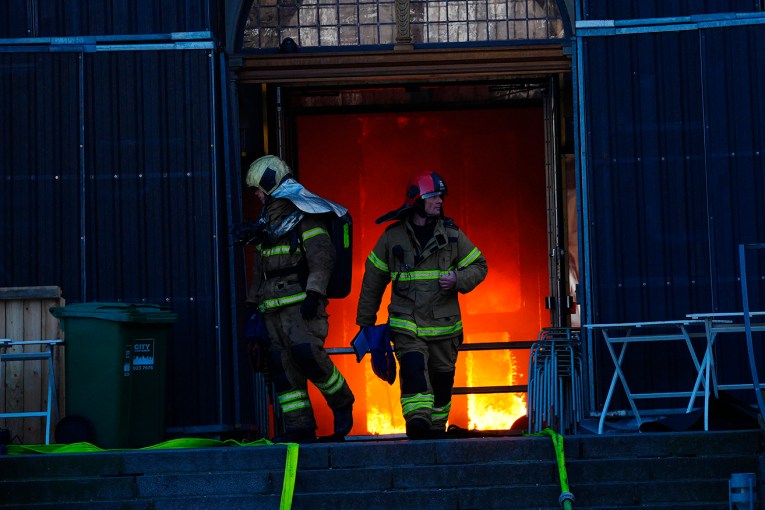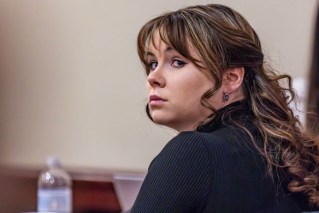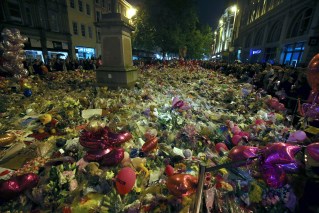Asylum system at breaking point

Hundreds of people have broken out of a Hungarian border camp while others set off on foot from Budapest to Austria, as authorities scrambled to contain a humanitarian crisis that has brought Europe’s asylum system to breaking point.
In chaotic scenes, a crowd of asylum seekers put at more than 1,000, including people in wheelchairs and on crutches, set off determined to get to the Austrian border 175 kilometres away, escaping a packed train held back by police for two days at Budapest’s Keleti railway station.
• Drowned toddler’s dad: ‘Let him be the last’
• Australia ‘almost ungovernable’
• New York Times attacks Australian boat policy
“We are very happy that something is happening at last. The next stop is Austria,” 23-year-old Osama from Syria said.

Asylum seekers are determined to march from Budapest to the Austrian border.
“The children are very tired, Hungary is very bad, we have to go somehow.”
The Hungarian government later offered to provide buses for those people trying to walk to the border.
In the south of the country, asylum seekers broke down barriers and wrestled with helmeted riot officers at an overcrowded border camp near Serbia.
Police said they had given chase and halted traffic on a nearby motorway after 300 people fled the reception centre in Roszke.
They said another 2,300 migrants still inside the camp were also threatening to break out.
Hungary said it was enforcing European Union (EU) rules that it must register all migrants caught crossing Hungary’s borders, but thousands are refusing and demanding they be allowed to continue their journey to western Europe from war and poverty in the Middle East, Africa and Asia.
In Bicske, west of Budapest, a two-day standoff ended after 300 people managed to escape from a train held up by police demanding they disembark and go to a nearby reception centre. The remainder went voluntarily.
“No camp. No Hungary. Freedom train,” someone had written with shaving foam on the side of the train.
“We don’t know what’s going on,” said Ahmed Mahmoud, a former Iraqi military officer who had lost both legs and was trying to join his daughter in Belgium.
“The police told us, get fingerprinted or face jail time. So we gave our fingerprints and they told us we can go. But we can’t go to the west. I just want to see my child in Belgium.”
Hungary’s right-wing government of prime minister Viktor Orban has vowed to take control of Europe’s worst migration crisis since the Yugoslav wars of the 1990s, promising to seal the country off within days to a flow of people that has topped 140,000 this year.
Hungary has become a flashpoint in the crisis as the main entry point into the Europe’s Schengen zone of passport-free travel for people travelling over land across the Balkan peninsula to reach richer and more generous countries further north and west.
Lawmakers moved to tighten migration laws that the government said would cut illegal entry to zero as of September 15 by creating transit zones on the border where asylum seekers would be held until their requests are processed, and deported if denied.
The measures introduce jail terms for those who cross the border without permission or damage a fence that Hungary is building along its 175-kilometre frontier with Serbia.
But Budapest’s hard line has produced scenes of chaos and desperation this week, symbolic of the discord and recriminations within a divided Europe over how to respond.

Riot police stand guard in front of a migrant reception centre in Hungary
The human cost was underlined as the father of Syrian toddler Aylan Kurdi, whose drowning on the crossing to Europe shocked the world, buried his family in their war-torn hometown.
Symbolising the human tragedy at the heart of the crisis, Aylan’s father Abdullah Kurdi returned Friday to the Syrian border town of Kobane to lay his son to rest along with Aylan’s brother and mother, who also died.
“I will have to pay the price for this the rest of my life,” the devastated father told mourners, after personally carrying his sons’ bodies to Kobane’s Martyrs’ Cemetery, where around 100 people attended the ceremony.
The family were driven out of Kobane in June after fierce fighting between Kurdish militants and Islamic State militants.
There was a global outrage after photos showed the little boy’s body lying in the surf of a Turkish resort, washed up after the boat taking the family to Greece sank.
Angry protesters booed European Commission vice-president Frans Timmermans and EU home affairs commissioner Dimitris Avramopoulos when they visited the Greek island of Kos.
EU foreign ministers met in Luxembourg to discuss the crisis ahead of a state of the union address next week by European Commission president Jean-Claude Juncker when he will lay out new measures which could well exacerbate EU differences.
Mr Juncker has proposed mandatory quotas for resettling 160,000 refugees, after an earlier plan for 40,000 met stiff opposition, notably from Hungary, and attracted offers of places for only 32,000.
Germany and France back quotas, but Hungary, the Czech Republic, Poland and Slovakia together rejected any quota systems.
Under-fire British prime minister David Cameron, accused of not doing enough to share the burden, said he would set out plans next week to take “thousands more” refugees. However, he insisted they would be refugees from camps on the border with Syria and not those already in other EU member states. To do that would just encourage more people to make the perilous journey to Europe, he said.
UN High Commissioner for Refugees Antonio Guterres has warned the EU faced a “defining moment” and called for the mandatory resettlement of 200,000 refugees by EU states.








